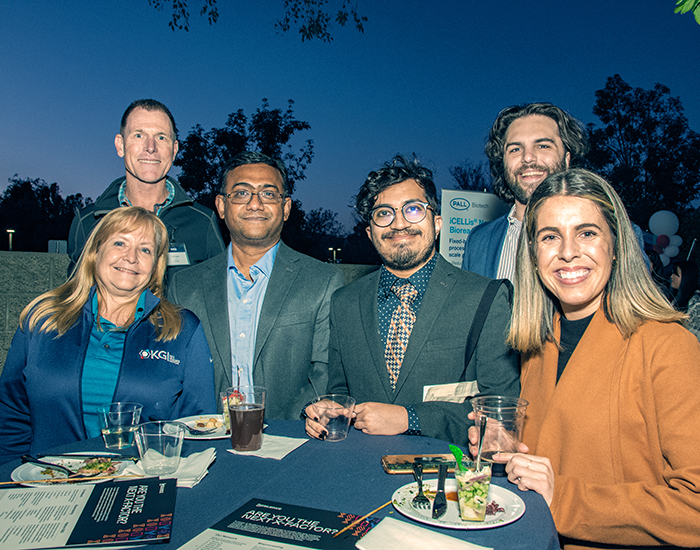Keck Graduate Institute’s partnership with biotech company ATUM has continued to develop in fruitful directions. Last year, the KGI ATUM Bioprocessing Scholars program gifted two-year scholarships to two Master of Engineering in Biopharmaceutical Processing (MEng) students with the goal of diversifying the biotech workforce. Since then, ATUM has donated an industrial high titer cell lines to the MEng lab and will continue to contribute additional cell lines and engage with KGI staff to develop relevant curriculum.
“We are excited to be working with Dr. Oren Beske and ATUM,” said Dr. Sue Behrens, George B. and Joy Rathmann Professor in Bioprocessing and Director of the Amgen Bioprocessing Center. “The ATUM scholarships and internship made it possible for two talented students to attend KGI to obtain the MEng degree and transform their career direction to contribute to the bioprocessing industry. In fact, one of the awardees is finishing up a summer internship at ATUM now.”
Dr. Oren Beske, ATUM’s Amalgamator of Business and Biology, has long been dedicated to promoting diversity in the workplace and providing opportunities for underrepresented minorities. Part of his efforts has involved connecting with junior colleges and other academic institutions in the San Francisco Bay Area, illustrating how bioprocessing and the biotech ecosystem at large is an exciting industry requiring a broad range of skill sets.
“From documentation to regulatory to sales and marketing to accounting to running reactors to supply chain management, there’s really a diverse set of career opportunities within biotech,” Beske said. “It’s a big, dynamic space, and it’s a very mission-driven space. We’re all here to promote global health and wellness.”
By talking to these students now, he is planting the seed.
“These students are early in their academic careers, and a master’s degree may seem far away, but if we get them excited about it now or at least inform them on the pathway where they can get these degrees, perhaps they’ll end up at a school like KGI or a company like ATUM,” Beske said.
Beske’s mission naturally led to his decision to partner with KGI to offer two MEng scholarships for underrepresented minorities.
“Historically, there haven’t been many minorities in bioprocessing and biotech, especially going back 15 or 20 years,” Beske said. “So with KGI’s efforts, we felt this was a unique opportunity to help diversify the workforce, to provide these students with a unique view into the industry, and to help them along their career paths afterward.”
Since Beske has learned more about KGI’s infrastructure and curriculum, he has been working on other ways to help enrich the MEng program. One such strategy is providing laboratory-based tools such as industry-standard manufacturing cell lines that express antibodies of interest and processes that can be transferred to KGI and used to educate and train students.
“Because ATUM doesn’t generate our own pharmaceutical products, our cell lines can be readily transferred to KGI without concern about trade secrets or proprietary information,” Beske said.
“We’re here to educate the broader community and to provide an infrastructure for education in general. This is an exciting opportunity for us to transfer knowledge and actual, physical entities to KGI to help train the students in modern bioprocessing techniques.”
Additionally, Beske and his ATUM colleagues have started working with Behrens and her colleagues in the MEng program on ways they can help to guide the curriculum.
“ATUM is making great progress in the development of novel technologies and processes that result in high-producing cell lines, and their donation to us will enhance our instructional labs by allowing students to work with state-of-the-art materials,” Behrens said.
Recently, Behrens has asked Beske to be on the Amgen Bioprocessing Center Advisory Board (ABCAB), a group of biotech professionals who advise the MEng program on industry trends to enrich the relationship between the two organizations further.
“ABCAB is a diverse group of folks, with some people interested in vaccines, some interested in scale-up and commercial volumes, and some like me who are more R&D and smaller scale oriented, but faster pace,” Beske said.
With this latest development, KGI’s bioprocessing programs will continue to flourish and uncover even more relevant ways to prepare the students for industry success.
“Oren has a broad background in the biotech industry and will bring great perspective to the Amgen Bioprocessing Center Advisory Board,” Behrens said. “We are looking forward to his feedback and direction as we build on the success of bioprocessing programs at KGI.”
